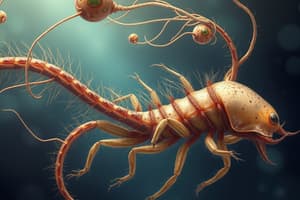Podcast
Questions and Answers
Stools after taking oil laxatives, barium, or bismuth salts are not suitable for examination due to their ___.
Stools after taking oil laxatives, barium, or bismuth salts are not suitable for examination due to their ___.
contamination
Water contamination will cause growth of non-pathogenic ___ organisms.
Water contamination will cause growth of non-pathogenic ___ organisms.
organisms
Trophozoites and cysts appear in stool by ___ to rule out a negative result.
Trophozoites and cysts appear in stool by ___ to rule out a negative result.
interval
Immediate examination must be observed to avoid disintegration of protozoan ___.
Immediate examination must be observed to avoid disintegration of protozoan ___.
Do not freeze or ___ stool samples to ensure the viability of the organisms present.
Do not freeze or ___ stool samples to ensure the viability of the organisms present.
In a ______, only the parasite derives benefit while the host may not be harmed.
In a ______, only the parasite derives benefit while the host may not be harmed.
A ______ host is one that harbors the parasite without showing symptoms.
A ______ host is one that harbors the parasite without showing symptoms.
______ is a relationship beneficial to both organisms.
______ is a relationship beneficial to both organisms.
______ hosts are responsible for transferring parasites from one location to another.
______ hosts are responsible for transferring parasites from one location to another.
In a parasitic relationship, the host experiences ______.
In a parasitic relationship, the host experiences ______.
CSF is collected in a sterile, tight sealing ______.
CSF is collected in a sterile, tight sealing ______.
Entamoeba gingivalis and Trichomonas tenax cause parasitic infection of the oral ______.
Entamoeba gingivalis and Trichomonas tenax cause parasitic infection of the oral ______.
The term ______ refers to parasites that can cause disease.
The term ______ refers to parasites that can cause disease.
Symbiosis literally means '______ together'.
Symbiosis literally means '______ together'.
Nasal Discharge is collected and examined for the presence of ______ fowleri.
Nasal Discharge is collected and examined for the presence of ______ fowleri.
Stool specimens should be collected in clean, wide-mouth containers with ______ fitting lids.
Stool specimens should be collected in clean, wide-mouth containers with ______ fitting lids.
The dependence degree of a parasite on its host can vary, causing ______ to one while benefiting the other.
The dependence degree of a parasite on its host can vary, causing ______ to one while benefiting the other.
Specimens should be collected prior to any anti-______ medications.
Specimens should be collected prior to any anti-______ medications.
Worms, eggs and protozoan parasites are best suited to detect in stool after ______.
Worms, eggs and protozoan parasites are best suited to detect in stool after ______.
Specimens should avoid contamination with any liquid such as urine and ______.
Specimens should avoid contamination with any liquid such as urine and ______.
Pus cells are associated with ______ structure.
Pus cells are associated with ______ structure.
Eye contact with infected swimming ______ can lead to health issues.
Eye contact with infected swimming ______ can lead to health issues.
______ are organisms that attack an unusual host, such as E. granulosus in humans.
______ are organisms that attack an unusual host, such as E. granulosus in humans.
A ______ host is one where the sexual reproduction of the parasite takes place.
A ______ host is one where the sexual reproduction of the parasite takes place.
______ parasites cannot survive without a host.
______ parasites cannot survive without a host.
Facultative parasites can live either a parasitic or free-living existence under favorable ______.
Facultative parasites can live either a parasitic or free-living existence under favorable ______.
An ______ host is where the larval or asexual stages of a parasite are found.
An ______ host is where the larval or asexual stages of a parasite are found.
The term ______ refers to organisms benefiting from living alongside others, often without harm.
The term ______ refers to organisms benefiting from living alongside others, often without harm.
N. fowleri is an example of a ______ parasite that can thrive under certain conditions.
N. fowleri is an example of a ______ parasite that can thrive under certain conditions.
Diagnosis of Acanthamoeba keratitis is best achieved by examination of ______
Diagnosis of Acanthamoeba keratitis is best achieved by examination of ______
N-acetyl-L-cysteine is a ______ agent that is used to digest mucoid specimens.
N-acetyl-L-cysteine is a ______ agent that is used to digest mucoid specimens.
Specimens drawn from the body by ______ can be examined for infections.
Specimens drawn from the body by ______ can be examined for infections.
A lumbar puncture is performed on patients showing symptoms of ______.
A lumbar puncture is performed on patients showing symptoms of ______.
Patients with certain infections may exhibit symptoms of ______.
Patients with certain infections may exhibit symptoms of ______.
Parasitic infections invade humans during the ______ stage.
Parasitic infections invade humans during the ______ stage.
Cerebrospinal fluid may occasionally be infected with ______ organisms.
Cerebrospinal fluid may occasionally be infected with ______ organisms.
Duodenal aspirates are employed for the demonstration of infections with ______.
Duodenal aspirates are employed for the demonstration of infections with ______.
Symptoms associated with parasitic disease include ______, fever, and abdominal pain.
Symptoms associated with parasitic disease include ______, fever, and abdominal pain.
The calcoflour white stain is used to examine scrapings directly for ______ infections.
The calcoflour white stain is used to examine scrapings directly for ______ infections.
One method used in diagnosing parasitic infection is through ______ examination.
One method used in diagnosing parasitic infection is through ______ examination.
Laboratory diagnosis is significantly based on laboratory ______ or test results.
Laboratory diagnosis is significantly based on laboratory ______ or test results.
Common treatment for parasitic infections includes ______ medications.
Common treatment for parasitic infections includes ______ medications.
It is essential to maintain good personal ______ to prevent parasitic infections.
It is essential to maintain good personal ______ to prevent parasitic infections.
Vitamin ______ deficiency can be a symptom of parasitic diseases.
Vitamin ______ deficiency can be a symptom of parasitic diseases.
Using protective ______ and netting can help prevent parasitic infections.
Using protective ______ and netting can help prevent parasitic infections.
Flashcards
Obligate Parasite
Obligate Parasite
Organisms that completely depend on a host for survival.
Facultative Parasite
Facultative Parasite
Organisms that can survive either as a parasite or independently.
Definitive Host
Definitive Host
The host where the parasite reaches its adult stage and reproduces sexually.
Intermediate Host
Intermediate Host
Signup and view all the flashcards
Accidental/Incidental Parasites
Accidental/Incidental Parasites
Signup and view all the flashcards
Parasite-Host Relationship
Parasite-Host Relationship
Signup and view all the flashcards
Commensalism
Commensalism
Signup and view all the flashcards
Parasitism
Parasitism
Signup and view all the flashcards
Carrier Host
Carrier Host
Signup and view all the flashcards
Reservoir Host
Reservoir Host
Signup and view all the flashcards
Transport Host
Transport Host
Signup and view all the flashcards
Mutualism
Mutualism
Signup and view all the flashcards
Pathogenic Parasite
Pathogenic Parasite
Signup and view all the flashcards
Symbiosis
Symbiosis
Signup and view all the flashcards
Infective Stage
Infective Stage
Signup and view all the flashcards
Diagnostic Stage
Diagnostic Stage
Signup and view all the flashcards
Clinical Diagnosis
Clinical Diagnosis
Signup and view all the flashcards
Laboratory Diagnosis
Laboratory Diagnosis
Signup and view all the flashcards
Dietary Changes
Dietary Changes
Signup and view all the flashcards
Antiparasitic Medications
Antiparasitic Medications
Signup and view all the flashcards
Fluid Replacement
Fluid Replacement
Signup and view all the flashcards
Recovery
Recovery
Signup and view all the flashcards
Aspirates
Aspirates
Signup and view all the flashcards
Direct Wet Mount
Direct Wet Mount
Signup and view all the flashcards
Concentration using N-acetyl-L-cysteine
Concentration using N-acetyl-L-cysteine
Signup and view all the flashcards
Culbertson's Medium
Culbertson's Medium
Signup and view all the flashcards
Calcofluor White Stain
Calcofluor White Stain
Signup and view all the flashcards
Giardia Lamblia
Giardia Lamblia
Signup and view all the flashcards
Naegleria
Naegleria
Signup and view all the flashcards
Cerebrospinal Fluid (CSF)
Cerebrospinal Fluid (CSF)
Signup and view all the flashcards
Urine Contamination in Stool Samples
Urine Contamination in Stool Samples
Signup and view all the flashcards
Immediate Stool Examination
Immediate Stool Examination
Signup and view all the flashcards
Stool Sample Handling
Stool Sample Handling
Signup and view all the flashcards
Multiple Stool Samples for Parasites
Multiple Stool Samples for Parasites
Signup and view all the flashcards
Stool Type and Parasite Stage
Stool Type and Parasite Stage
Signup and view all the flashcards
Oral Mucosa and Gingival Infections
Oral Mucosa and Gingival Infections
Signup and view all the flashcards
Nasal Discharge Parasites
Nasal Discharge Parasites
Signup and view all the flashcards
Stool Collection for Parasitology
Stool Collection for Parasitology
Signup and view all the flashcards
Medications Before Stool Collection
Medications Before Stool Collection
Signup and view all the flashcards
Stool Collection After Enemas
Stool Collection After Enemas
Signup and view all the flashcards
Stool Elements Mistaken for Parasites
Stool Elements Mistaken for Parasites
Signup and view all the flashcards
Distinguishing Features of Stool Elements
Distinguishing Features of Stool Elements
Signup and view all the flashcards
Avoiding Contamination in Stool Samples
Avoiding Contamination in Stool Samples
Signup and view all the flashcards
Study Notes
Parasitology
- Parasitology is the study of organisms that depend on another organism for survival.
- It involves understanding parasites that infect humans, including their morphology, epidemiology, life cycles, the diseases they cause, host responses, and preventative measures.
Mode of Transmission
- Parasites can be transmitted via ingestion of contaminated food or water.
- Hand-to-mouth contact, insect bites, sexual contact, and contact with contaminated water can also spread parasites.
Parasite-Host Relationship
- Ectoparasites: Live externally on the host. Examples include lice and some types of amoeba. Host infection by these parasites is called infestation.
- Endoparasites: Live internally within the host's body. Examples include protozoa and helminths. Host infection by these parasites is called infection.
- Obligate Parasites: Organisms that cannot survive without a host (e.g., Toxoplasma gondii).
- Facultative Parasites: Organism with the ability to live either inside or outside their host (e.g., N. fowleri).
Types of Hosts
- Definitive Host: Host where the parasite undergoes sexual reproduction.
- Intermediate Host: Host where the parasite undergoes asexual reproduction or develops larval stages..
- Accidental/Incidental host: Host that is not the normal host of the parasite but may be infected if exposed.
- Reservoir Host: This host can pass the parasite on to another susceptible host.
Other Terms
- Symbiosis: A relationship involving two or more species that benefit from each other's presence.
- Commensalism: A symbiotic relationship where one organism benefits and the other is neither harmed nor helped.
- Mutualism: A symbiotic relationship where both organisms benefit.
- Parasitism: A symbiotic relationship where one organism (the parasite) benefits at the expense of the other (the host), often causing harm.
Diagnostic Methods
- Clinical Diagnosis Physical examination based on signs & symptoms
- Laboratory Diagnosis Based on the evaluation of laboratory reports for parasitic identification. Includes examining stool, blood, CSF (cerebrospinal fluid), urine, or other specimens
Treatment
- Treatments will vary based on the specific parasite and the severity of the infection.
- Common treatments include antiparasitics, diet changes, and vitamin supplements.
Prevention and Control
- Prevention methods include maintaining good sanitation, avoidance of unprotected sexual activity, avoiding consumption of contaminated water/food. Developing parasite awareness programs.
Studying That Suits You
Use AI to generate personalized quizzes and flashcards to suit your learning preferences.





